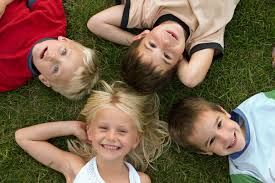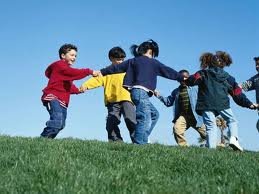 Put the Play Back Into Playtime
Put the Play Back Into Playtime
“Get back in the game, buddy!” calls out a dedicated dad when he sees his 4-year old athlete poking twigs in the ground to make a stick house.
Hmmm. Two kinds of play here. Soccer and imaginary twig towns.
Remember “Just Playing?”
 Today’s young children certainly play more soccer and t-ball. They jump on bouncers, flap parachutes and scarves together, and clamber through ballpits in “play places.” Our children master video games created just for them and many maneuver a smart phone better than adults! There are fewer twig towns out there these days.
Today’s young children certainly play more soccer and t-ball. They jump on bouncers, flap parachutes and scarves together, and clamber through ballpits in “play places.” Our children master video games created just for them and many maneuver a smart phone better than adults! There are fewer twig towns out there these days.
Do children play the same way today as we did when we were kids?
When many of us were kids, we mostly “just played.” We ran around, colored a lot of pictures, created castles, played dress-up and hide-n-seek. Adults made sure we were safe and reasonably non-destructive.
Most adults have sweet memories of childhood play. Usually these memories involveoutdoors. Usually other children were around. And there wasn’t a lot of grownup direction.
Facebook is filled with nostalgic postings with a recurrent theme about growing up: there were no preschool sports teams, no video games, hardly any TV. Remember how much fun it was?
Children Today Have Less Unstructured Free Play
Despite these fond memories, young children’s play today is more structured and regulated than ever. According to Kaboom, an organization dedicated to reclaiming play, children have continuously lost time to “just play” since the 1970s. Children spend 12 hours less in free play each week than in the 70’s. One study found that the average American child spends only 4 to 7 minutes in unstructured outdoor play per day.
The consequences when children no longer “just play” go beyond a sense of nostalgia for the “good old days.”
 Free Play Has Important Benefits for Children
Free Play Has Important Benefits for Children
Research shows that free and unstructured play supports children’s overall health, cognitive development, and social-emotional skills. Child-initiated and child-driven, free play is generally creative, imaginative, and not guided or structured by adults. For some children, structured play may actually create stress; free play is often a stress reliever. It is a positive outlet for pent-up energy which can result in improved behavior.
When children choose and explore their own play themes – they are expanding their curiosity,problem-solving, and critical thinking. They are “pretending” and learning social interactions and rules. They are strengthening their bodies. They are practicing self-control and persistence.
Study after study links positive outcomes for children to having sufficient time to just play. Better academic performance, more comfortable social relationships, more confident self-image. Lower rates of obesity.
Experts Advocate for More Time to “Just Play”
The importance of children’s play plus the current, worrisome decline in the amount of time children spend at free play so concerns health experts, pediatricians, and educators that many are advocating strongly for reclaiming children’s time to play.
Clemson University launched the US Play Coalition – a partnership to promote the value of play throughout life. There are national and worldwide organizations dedicated to “Days of Play” and other celebrations designed to bring attention to the value of play. Even the American Academy of Pediatrics has formally stated that free, unstructured play is essential to healthy development in children.
How Caring Adults Can Support Unstructured Free Play for Children
Of course all play must be appropriately supervised by adults, but with that in mind…
- Allow time just for unstructured, unregulated free play.
- Let children take the lead.
- Supply simple toys. Some of the best toys for children are boxes, blocks, and dolls. “No batteries” is good!
- Take it outside.
- Allow some boredom. Feeling a little bored can spur the imagination.
- Let some messiness happen.
- Enjoy the inevitable laughter and spontaneity.
This article was provided by AcornDreams.com. AcornDreams has resources that build young children’s social skills, self-control, problem-solving abilities and healthy habits. Practical tips and easy-to-use materials are ideal for parents, teachers, and others active in the lives of young children. Printable handouts, original children’s books and music, behavior guides, and a blog offer sensible ideas to guide children’s positive development.

 Birthdays
Birthdays